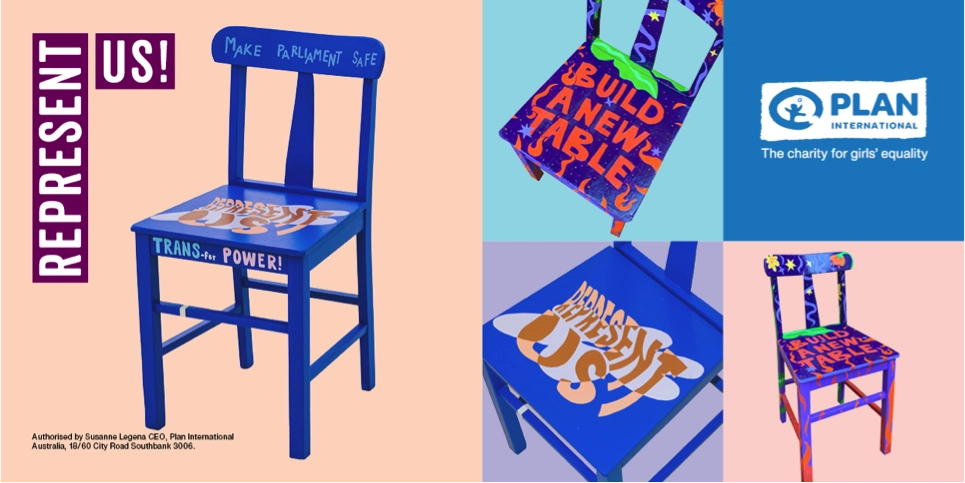Media Centre - Media release - 9 May 2022
Three quarters of young women voting for first time in the federal election do not believe Australian politics is an equal space for women and people of colour

From sexism and misogyny to racism, homophobia, transphobia and a lack of inclusive practices for people living with a disability, new Plan International Australia research has found that 72% of young Australian women do not feel politics is an equal or inclusive space for them.
What’s more, 60% of the young people surveyed said that they didn’t feel that Parliament has become any more safe or equal in the last 12 months – despite multiple reviews into the toxic culture of Parliament and promises to fix things.
When Plan International Australia spoke to young women in 2021, right after Brittany Higgins bravely came forward with rape allegations, a mere 1 in 10 (10%) felt Parliament was a safe place for them to work.
On an intersectional level, the perceptions of safety and equality in politics is even bleaker: one third of CALD young women said they would not ever consider politics as a career because of their cultural or ethnic background and because our Parliament is not diverse enough; while more than four in 10 young women with a disability cited a lack of inclusive practices as the reason they would abandon their dreams of working in politics.
The data is part of Represent Us, a new report launched today by the charity for girls’ equality that lays bare the “white boys club” that is the Canberra bubble and includes powerful recommendations on how we can make Parliament more equal and safe, right now.
Plan International Australia youth activist and one of the report’s authors, Janice, said she shared these perceptions:
“If I wanted to enter politics, the reality is that it’s not up to me trying my hardest. Political parties have the power to decide if I’m suitable to be in the public eye because of my race, even if I can represent the voices of my community.”
“The report found that the toxic culture oozing through the heart of Australian politics is deterring girls and young people from careers in Parliament. The result is that we are losing out on an entire generation of bright, powerful and diverse voices who could transform and lead this country for the better,” added Plan International Australia CEO Susanne Legena.
The survey, conducted by YouGov, questioned more than 1,000 young women and gender diverse people – most of whom are voting in the upcoming 2022 federal election for the first time – on their views, values and aspirations when it comes to Australian politics.
It also found:
- More than 90% of young women believe that our national Parliament should reflect the reality of diversity of Australia
- Yet almost 60% of young women said they would be more likely to pursue a career in politics if it was more diverse.
- In fact, 82% said there should be diversity targets to ensure that women and people across all ethnicities are being represented.
- Almost half of those surveyed would not want to pursue a career in politics because they think they would be discriminated against for being female.
- Almost 90% of young women feel it’s easier for men to success in politics. This view is shared across the political spectrum (90% for those aligned with Labor, 90% Coalition, and 92% Greens).
- Over 80% of young women have never aspired to be PM
- A number of respondents stated the importance of a federal ICAC to improve the safety and equality of Parliament
- A number of respondents also emphasised the importance of better representation of First Nations people in politics, consulting with First Nations people during policy development, and respecting Indigenous perspectives
Politics needs a plan: these are the steps young people say that a new Government can and must take
In the lead up to the 2022 federal election, Plan International Australia and its youth advocates are calling for:
- Political leadership that’s free from sexism and misogyny – with all parties committing to implement the full, transformative suite of recommendations in Sex Discrimination Commissioner Kate Jenkins’ ‘Set the Standard’ report in the next 6-18 months
- All parties to commit to introducing mechanisms to report back to survivors on the implementation of the ‘Set the Standard’ recommendations.
- All parties setting targets for the representation of women, if they do not already have them, and targets for people of different ethnicities as a first step to ensuring that Federal Parliament reflects the diversity of Australia.
“When it comes to political representation, the reality is that we are not there yet, and even when we are, we’re not safe,” said Plan International Australia ambassador Yasmin Poole.
“However, I refuse to turn away from democracy and politics despite seeing this inequality and violence play out. As a young woman of colour, I see how doing this would only reward those who want us to remain silent. That does not mean I will pretend this systemic injustice does not exist,” she said,
“I know, from first hand experience as a young, former staffer, that Parliament is a reflection of the on-going power and privilege systems at play,” added Ms Legena.
“I was furious by the findings of this report – that despite endless pledges and promises to close the gender gap in politics, that women still only make up 38% of MPs and Senators. We are falling behind the rest of the world: in 2006 Australia ranked 22 out of 155 countries on the World Bank’s Gender Index for women’s political empowerment. In 2021, Australia was ranked 54. Over the last 15 years we have dropped 22 places. This is not good enough.”
“I am, quite frankly, appalled that when it comes to representation of people from different ethnicities, we are even further behind. Less than 5% of parliamentarians come from diverse ethnicities, there are just six Indigenous parliamentarians and there are zero parliamentarians who have shared they are trans, non-binary or gender diverse.
“This can have a devastating impact on girls growing up and forming their career aspirations and confidence. You can’t be what you can’t see, so the result of these statistics is that an entire generation of girls is growing up with the message that politics is not for them. We have to change this,” she said.
Plan International Australia believes that setting targets for greater representation of women and people of different ethnicities is what major parties can do as a first step to transform Parliament into a safer and more inclusive democracy. It is also essential that our national Parliament represents people across the diversity of Australia, including First Nations people, LGBTIQ people and people living with a disability, recognising that targets are not suitable for every unrepresented group.
Put simply, at the highest levels there is insufficient data and understanding about representation in Parliament. If we want equality and safety we need to collect and act on data to drive and evolve how Parliament can be more inclusive, and safe as echoed in the Set the Standard report.
“Not collecting data on the ethnic diversity of Parliament shows that politicians aren’t seeing representation as a big issue,” said Plan International Australia youth activist Grace.
“If there’s no data, it shows that, in terms of priorities, the diversity of politicians is way down the bottom.”
Media contacts


